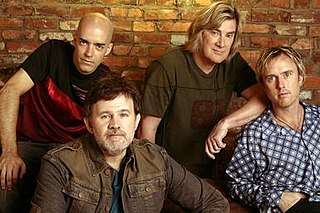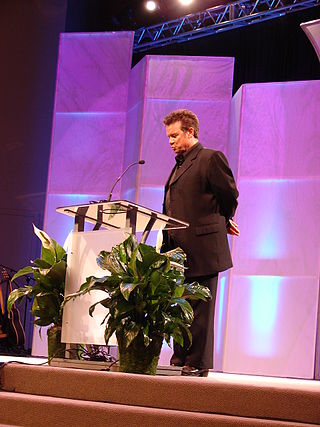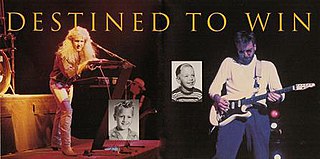Related Research Articles
Christian rock is a form of rock music that features lyrics focusing on matters of Christian faith, often with an emphasis on Jesus, typically performed by self-proclaimed Christian individuals. The extent to which their lyrics are explicitly Christian varies between bands. Many bands who perform Christian rock have ties to the contemporary Christian music labels, media outlets, and festivals, while other bands are independent.

Contemporary Christian music (CCM), also known as Christian pop, and occasionally inspirational music, is a genre of modern popular music, and an aspect of Christian media, which is lyrically focused on matters related to the Christian faith and stylistically rooted in Christian music. It was formed by those affected by the 1960s Jesus movement revival who began to express themselves in other styles of popular music, beyond the church music of hymns, gospel and Southern gospel music that was prevalent in the church at the time. Initially referred to as Jesus music, today, the term is typically used to refer to pop, but also includes rock, alternative rock, hip hop, metal, contemporary worship, punk, hardcore punk, Latin, electronic dance music, R&B-influenced gospel, and country styles.

DC Talk is a Christian rap and rock trio. The group was formed at Liberty University in Lynchburg, Virginia in 1987 by Toby McKeehan, Michael Tait, and Kevin Max Smith. They released five major studio albums together: DC Talk (1989), Nu Thang (1990), Free at Last (1992), Jesus Freak (1995), and Supernatural (1998). In 2002, the Encyclopedia of Contemporary Christian Music called DC Talk "the most popular overtly Christian act of all time."
Christian metal, also known as white metal, Jesus metal or heavenly metal, is heavy metal music distinguished by its Christian themed song lyrics and the dedication of the band members to Christianity. Christian metal is typically performed by professed Christians, principally for Christians and is often produced and distributed through various Christian networks.
Christian hip hop is a cross-genre of contemporary Christian music and hip hop music. It emerged from urban contemporary music and Christian media in the United States during the 1980s.

Resurrection Band, also known as Rez Band or REZ, was a Christian rock band formed in 1972. They were part of the Jesus People USA Christian community in Chicago and most of its members have continued in that community to this day. Known for their blend of blues-rock and hard rock, Resurrection Band is credited as one of the forerunners of the Christian metal genre. Christianity Today called them "the most influential band in Christian music history." Following their debut in 1978, the band's greatest popularity was during the early 1980s, but later in the decade they received some crossover success when they had two music videos featured on MTV.

Petra is an American music group regarded as a pioneer of the Christian rock and contemporary Christian music genres and was, for many years, regarded as the "world's most popular Christian rock band". Formed in 1972, the band took its name from the Greek word for "rock". Though it disbanded formally in 2006, incarnations have played reunion shows in the years since and released two albums in November 2010, and in November 2017. In 2013, it reformed with a new drummer, Cristian Borneo, and recorded a new song titled "Holy is Your Name", before going back on tour.
Christian punk is a form of Christian music and a subgenre of punk rock which contain Christian lyrical content. Much disagreement persists about the boundaries of the subgenre, and the extent that their lyrics are explicitly Christian varies among bands. For example, The Crucified explicitly rejected the classification of "Christian punk" while staying within the Christian music industry.

Benny Ray Hester is an American musician, singer, songwriter and recording artist. He is perhaps best known for his songs "When God Ran" and "Nobody Knows Me Like You", and for producing the groundbreaking tween/teen music-driven sketch comedy and dance television series Roundhouse on Nickelodeon. Hester received a television Cable Ace Award for the song "I Can Dream" and a collection of nominations for writing and producing a featured original song for each weekly episode of Roundhouse during its successful four-year run. He has written and recorded more than 25 number one and top ten songs.
Sonicflood is an American contemporary worship music band from Nashville, Tennessee, that has been touted as "The Fathers of the Modern Worship Movement." The group took the name "Sonicflood", a reference to a line in the Book of Revelation, chapter 19, verse 6.

Russell Taff is an American gospel singer and songwriter who grew up in Farmersville, California. He has sung a variety of musical styles throughout his career including: pop rock, traditional Southern gospel, contemporary country music, and rhythm and blues. He first gained recognition as lead vocalist for the Imperials (1976–81). One of his best-known performances is the song "Praise the Lord". He has also been a member of the Gaither Vocal Band, and occasionally tours with Bill Gaither in the Gaither Homecoming concerts. As a solo artist and songwriter, Taff is known for the 1980s anthem "We Will Stand". Taff has received various Dove and Grammy awards either as a solo artist or part of a larger musical group, most notably the Imperials.

DeGarmo & Key was a Christian rock band/duo formed in 1977 by Eddie DeGarmo and Dana Key. The group is notable for having the first Christian rock album nominated for a Grammy award and the first American Christian group to have a video entered into MTVs rotation. They are also noted as being among the first groups to raise the level of technical excellence to match general market releases of the time. While the group played blues based rock with a minor British progressive rock influence, they migrated to a more pop and rock style as time went on. DeGarmo played keyboards and sang background vocals, while Key played lead guitar and did the majority of the lead vocals. The other musicians at the time of formation in the late 70s were John Hamptone, David Spain, Max Richardson and Terry Moxley (drums) along with Joe Hardy and Ken Porter (bass). Later members included Tommy Cathey on bass (1982), Greg Morrow on drums as well as Tony Pilcher on rhythm and second lead guitar. Some of their more notable hits include: "Destined to Win", "Let the Whole World Sing", "Six, Six, Six", "Boycott Hell", "Every Moment" and "Casual Christian". The group is also noted for their albums Streetlight (1986), D&K (1987), and The Pledge (1989). Other musicians who have recorded or toured with DeGarmo & Key include Kenny Porter (bass), Kevin Rodell (drums), Chuck Reynolds (drums), Steve Taylor (guitar) and Mark Pogue (guitar). The group was nominated for seven Grammy Awards and five Dove Awards DeGarmo and Key disbanded in 1995.
Squad Five-O is an American punk rock band from Savannah, Georgia no longer formally touring or recording, but rather only performing occasional weekend concerts. Like their initial ska-punk stylings, their name was derived from a cross between the television shows Hawaii Five-O and The Mod Squad. Between 1997 and 2006 the band grew lyrically and in popularity, and also shifted its style significantly. Over the course of their career they moved from a small indie Christian label to the major label Capitol Records and released five albums in the process.

A Christian music festival is a music festival held by the Christian community, in support of performers of Christian music. The festivals are characterized by more than just music; many feature motivational speakers and evangelists, and include seminars on Christian spiritual and missions topics, service, and evangelism. They are often viewed as evangelical tools, and small festivals can draw 10 times the crowd of traditional revival meetings. While the central theme of a Christian festival is Jesus Christ, the core appeal of a Christian music festival remains the artists and their music. Critics point out that the dichotomy of business and religious interests can be problematic for Christian festivals. In similar ways as the Christian music industry in general, festivals can be drawn away from their central theme and gravitate toward commercialization and mainstream acts in an attempt to draw crowds.

KMGRecords was a Christian record label. The label was established in 1997 by Buddy Killen as a subunit of the Killen Music Group / Buddy Killen Enterprises and sold in late 1998 to Cal Turner III, who is related to the Cal Turner of Dollar General stores. Following the sale, Buddy Killen continued to consult for the firm.
Christian ska is a form of Christian alternative rock, and subgenre of ska and ska punk which is lyrically oriented toward contemporary Christian music. Though ska did not constitute a genre within the Christian music industry until after third wave ska had peaked in the general market, Christian ska continued to thrive independently into the early 2000s.

Pamplin Music was an independent Christian record label founded in 1995 by Robert B. Pamplin Jr. The label was a subunit of Pamplin Entertainment and in turn Pamplin Communications, which was already established in the Christian media market through book stores and video products.

Until the Whole World Hears is the fourth studio album by American Christian rock band Casting Crowns. Released on November 17, 2009, the album was produced by Mark A. Miller and features a sound that has been described as 'pure American rock', 'soft adult contemporary', and 'CCM'. Lyrically, the album discusses Christian subjects such as God, Jesus, and salvation, with several songs being reinventions of classic hymns. Until the Whole World Hears sold over 167,000 copies in its first week, Casting Crowns' highest sales week to date, and debuted at No. 4 on the Billboard 200 and at No. 1 on the Billboard Christian Albums chart. In the United States, the album ranked as the 37th best-selling album of 2010 and the 137th best-selling album of 2011; it ranked as the first and third best-selling Christian album in those years, respectively. It has sold over 1.1 million copies and been certified platinum by the Recording Industry Association of America (RIAA).
Reba Rambo is an American Christian singer and songwriter. She is a Grammy and Dove Award winner.
Urban/contemporary gospel is a modern subgenre of gospel music. Although the style developed gradually, early forms are generally dated to the 1970s, and the genre was well established by the end of the 1980s. The radio format is pitched primarily to African-Americans. Christian hip hop can be considered a subtype of this genre.
References
- ↑ Mungons & Yeo 2021 , pp. 91–112
- ↑ Mall 2020 , pp. 13–16
- 1 2 3 4 Powell 2002 , "Introduction" pp. 9–13.
- 1 2 3 Forbes & Mahan 2000 , "Evangelicals and Popular Music: The Contemporary Christian Music Industry" pp. 105–109
- 1 2 3 4 5 6 7 8 9 Cusic 2002 , Part Four, pp. 279–386
- ↑ Mount, Daniel J. (2005). A City on a Hilltop? The History of Contemporary Christian Music. p. 50. Archived from the original on February 3, 2007. Retrieved February 12, 2007.
- ↑ Hale, Mark (1993). "2869". Headbangers (First edition, second printing ed.). Ann Arbor, Michigan: Popular Culture, Ink. p. 336. ISBN 1-56075-029-4.
- ↑ "Christian Rock Wars: Evangelist Jimmy Swaggart Tells Why He Hates Today's Christian Rock". CCM Magazine . 7 (12): 14–17. June 1985. ISSN 1524-7848.
- ↑ "Articles / Christian Music". Dial-the-Truth Ministries.
- ↑ Gascon, Ana (December 1991). "A Music Video Network That Needs To Be Zeen". CCM Magazine . 14 (6): 12. ISSN 1524-7848.
- 1 2 Warren, Lindy (December 22, 1997). "Top 15 Impact-makers in 1997". CCM Update. OCLC 22937802.
- 1 2 Gillespie, Natalie Nichols (March 29, 1999). "Gospel Music Sees Record-setting RIAA Numbers". CCM Update. OCLC 22937802.
- 1 2 Warren, Lindy (March 19, 2001). "RIAA Consumer Report: Christian Music Marketshare Declines in 2000". CCM Update. OCLC 22937802.
- 1 2 Gillespie, Natalie Nichols (March 17, 1997). "Gospel Is Fastest-Growing Genre". CCM Update. OCLC 22937802.
- ↑ Brasher, Joan (July 12, 1999). "Christian Music's Mid-Year Sales Jump 21 Percent". CCM Update. OCLC 22937802.
- ↑ Akins, Debra (1995). "The Year in Review: 1995 Broke New Ground for Christian Music". CCM Update. OCLC 22937802.
- ↑ "God's Own Country". The Economist. Vol. 336, no. 7928. August 19, 1995.
- ↑ Warren, Lindy (January 26, 1998). "CMTA Launches Dove Retail, Radio Campaign, Wal-Mart to expand Christian music sections". CCM Update. OCLC 22937802.
- 1 2 Connor, Lizza (January 7, 2002). "Christian Music Sales Set Record for 2001: Gap between general-market and Christian retailers widest in SoundScan history". CCM Update. OCLC 22937802.
- ↑ Warren, Lindy (November 19, 2001). "General-market Competition Focus for CBA Expo 2002". CCM Update. OCLC 22937802.
- 1 2 3 4 Geil, Mark (June 2, 2009). "Music in Recession". Christianity Today . ISSN 0009-5753.
- ↑ Feinberg, Margaret (April 15, 2000). "Modern Worship Is Exploding". Christian Retailing. 46 (8): 45–56.
- ↑ McCabe, Ginny (July 1999). "Praise & Worship Music Changing for the Millennium". CBA Marketplace. 32 (7): 222.
- ↑ Price, Deborah Evans (May 1, 1999). "Worship Music Targets Youth". Billboard . Vol. 111, no. 18. ISSN 0006-2510.
- 1 2 "Gospel and Christian". Billboard . Vol. 118, no. 13. April 1, 2006. pp. 35–37. ISSN 0006-2510.
- ↑ Price, Deborah Evans (February 15, 2003). "Praise and Worship Genre Blessed With Global Growth". Billboard . Vol. 115, no. 7. ISSN 0006-2510.
- ↑ Riddle, Melissa (May 29, 2000). "Modern Worship Music Booms: Labels scramble to meet demand". CCM Update. OCLC 22937802.
- ↑ Blow, Charles M. (July 31, 2009). "Swan Songs?". The New York Times . p. A17. Retrieved September 23, 2009.
- 1 2 3 4 Nichols 2008 , Chapter 5: "Jesus on Vinyl" pp. 122 – 146
- 1 2 3 4 5 Howard & Streck 1999 , p. 9
- 1 2 Hendershot 2004 , pp. 39–84
- 1 2 3 "Consumer Survey Reveals Potential Markets for Christian Music". CCM Update. May 26, 1997. OCLC 22937802.
- ↑ Kyle 2006 , "If You Can't Beat 'em Join 'em" pp. 281–286
- ↑ Pyle, Hugh (1985). The Truth About Rock Music. Murfreesboro, Tennessee: Sword of the Lord Publishers. ISBN 0-87398-839-6.
- 1 2 Romanowski, William D. (Fall 1992). "Roll Over Beethoven, Tell Martin Luther The News: American Evangelicals and Rock Music". Journal of American Culture. Bowling Green State University. 15 (3): 79–82. doi:10.1111/j.1542-734X.1992.t01-1-00079.x.
- 1 2 Powell 2002 , "Randy Matthews" pp. 566–569.
- ↑ Rabey, Steve (December 1980). "Randy Matthews... The Long Road To Now". CCM Magazine . 3 (6): 14. ISSN 1524-7848.
- 1 2 3 Powell 2002 , "Bob Dylan" pp. 277 – 286.
- ↑ Powell 2002 , "Larry Norman" pp. 633–641.
- ↑ "Christian Rock's 'Father' Dies: icon Larry Norman was often estranged from the industry". Christianity Today . 52 (4): 13. April 2008. ISSN 0009-5753.
- ↑ Jeffries, Vincent. "Upon This Rock". Allmusic. Retrieved April 26, 2009.
- ↑ Thompson, John J. (April 2008). "Remembering Larry Norman". CCM Magazine . 24 (9): 42. ISSN 1524-7848.
- ↑ Moll, Rob (June 2006). "Rock Un-Solid: When Christian bands bite the hands that praised them". Christianity Today .
- ↑ Martens, Todd (March 11, 2006). "A question of faith: buzz band Mutemath, preferring secular rock, sues Warner". Billboard Magazine . 118 (11).
- 1 2 Holub, Annie (January 19, 2006). "Church and State: Mutemath fights the machine at Warner Bros". Tucson Weekly .
- 1 2 Hortegas, Steve (May 1978). "H-E-R-E-S'S Christian Show Biz!". Eternity. 29 (5).
- ↑ Alfonso 2002 , "Contemporary Christian music: A History" pp. 11–29.
- ↑ "Dove Award Recipients for Hard Music Recorded Song". Gospel Music Association. Archived from the original on January 6, 2002. Retrieved November 15, 2006.
- ↑ "Dove Award Recipients for Hard Music Album". Gospel Music Association. Archived from the original on April 6, 2002. Retrieved November 15, 2006.
- ↑ Winters, Kelly (2005). "Project 86". In Pilchak, Angela M. (ed.). Contemporary Musicians. Volume 52. Farmington Hills, Michigan: Gale Group. pp. 129–130. ISBN 0-7876-8065-6. ISSN 1044-2197.
- ↑ Gonzales, Ron (May 28, 2004). "Wide range of music inspires Project 86". Albuquerque Journal . p. 2D.
- ↑ Dodd, Jason (May–June 2000). "Hard and Fast". 7ball (30): 51–52. ISSN 1082-3980.
- ↑ DiBase, John (April 23, 2007). "I want Rival Factions". Jesus Freak Hideout. Retrieved October 23, 2008.
- ↑ "Switchfoot steps toward stardom". The Boston Globe . January 9, 2004. Archived from the original on January 23, 2005. Retrieved August 9, 2006.
- ↑ "Question and Answer with Switchfoot's Jon Foreman". October 13, 2004. Archived from the original on February 8, 2013. Retrieved August 9, 2006.
- ↑ "Rocking for Jesus". June 30, 2006. Archived from the original on July 6, 2006. Retrieved August 9, 2006.
- ↑ "A Cable Music First? Lamb & Lion act to be seen and heard on MTV". Billboard. Vol. 88, no. ?. Billboard Magazine. November 20, 1982. p. 43.
- ↑ "MTV Rejects DeGarmo and Key Video, Cites 'Violent' Scene". MusicLine. CCM Communications. 2 (9): 3, 15. February 1985. ISSN 0746-7656.
- 1 2 "DeGarmo and Key Video Airs on MTV". MusicLine. CCM Communications. 3 (1): 3. May 1985. ISSN 0746-7656.
- 1 2 "Ex-Korn guitarist Brian "Head" Welch defends 'controversial' video". Blabbermouth.net . September 25, 2008. Retrieved November 1, 2008.
- 1 2 3 Gow, Joe (Summer 1999). "Rockin', Rappin', and Religion: Programming Strategy on Z Music Television". Popular Music and Society. Bowling Green State University Popular Press. 23 (2): 17. doi:10.1080/03007769908591730. ISSN 0300-7766.
- 1 2 Forbes & Mahan 2000 , "Evangelicals and Popular Music: The Art World of Contemporary Christian Music" pp. 109–115
Sources
- Mungons, Kevin; Yeo, Douglas (2021). Homer Rodeheaver and the Rise of the Gospel Music Industry. University of Illinois Press. ISBN 978-0-252-08583-3.
- Mall, Andrew (2020). God Rock, Inc.: The Business of Niche Music. University of California Press. ISBN 978-0-520-34342-9.
- Graham, Sandra Jean (2018). Spirituals and the Birth of a Black Entertainment Industry. University of Illinois Press. ISBN 978-0-252-08327-3.
- Suisman, David (2012). Selling Sounds: The Commercial Revolution in American Music. Harvard University Press. ISBN 978-0-674-06404-1.
- Nichols, Stephen J. (2008). Jesus Made in America. Intervarsity Press. ISBN 978-0-8308-2849-4.
- Kyle, Richard (2006). Evangelicalism : an Americanized Christianity. New Brunswick, New Jersey: Transaction Publishers. ISBN 0-7658-0324-0.
- Hendershot, Heather (2004). Shaking the World for Jesus: Media and Conservative Evangelical Culture. Chicago, Illinois: University of Chicago Press. ISBN 0-226-32679-9.
- Peacock, Charlie (2004). At The Crossroads: Inside the Past, Present, and Future of Contemporary Christian Music. Shaw Books. ISBN 978-0-877-88128-5.
- Alfonso, Barry (2002). The Billboard Guide to Contemporary Christian Music. Billboard Books. ISBN 0-8230-7718-7.
- Cusic, Don (2002). The Sound of Light: A History of Gospel Music (First Hal Leonard ed.). Milwaukee, WI: Hal Leonard Corp. ISBN 0-634-02938-X. Original publication, 1990, Bowling Green State University Popular Press. Bowling Green, Ohio.
- Powell, Mark Allan (2002). Encyclopedia of Contemporary Christian Music (First printing ed.). Peabody, Massachusetts: Hendrickson Publishers. ISBN 1-56563-679-1.
- Forbes, Bruce David; Mahan, Jeffrey H., eds. (2000). Religion and Popular Culture in America. Berkeley, California: University of California Press. ISBN 0-520-21324-6.
- Howard, Jay R; Streck, John M. (1999). Apostles of Rock: The Splintered World of Contemporary Christian Music. Lexington, Kentucky: The University of Kentucky Press. ISBN 0-8131-9086-X.
